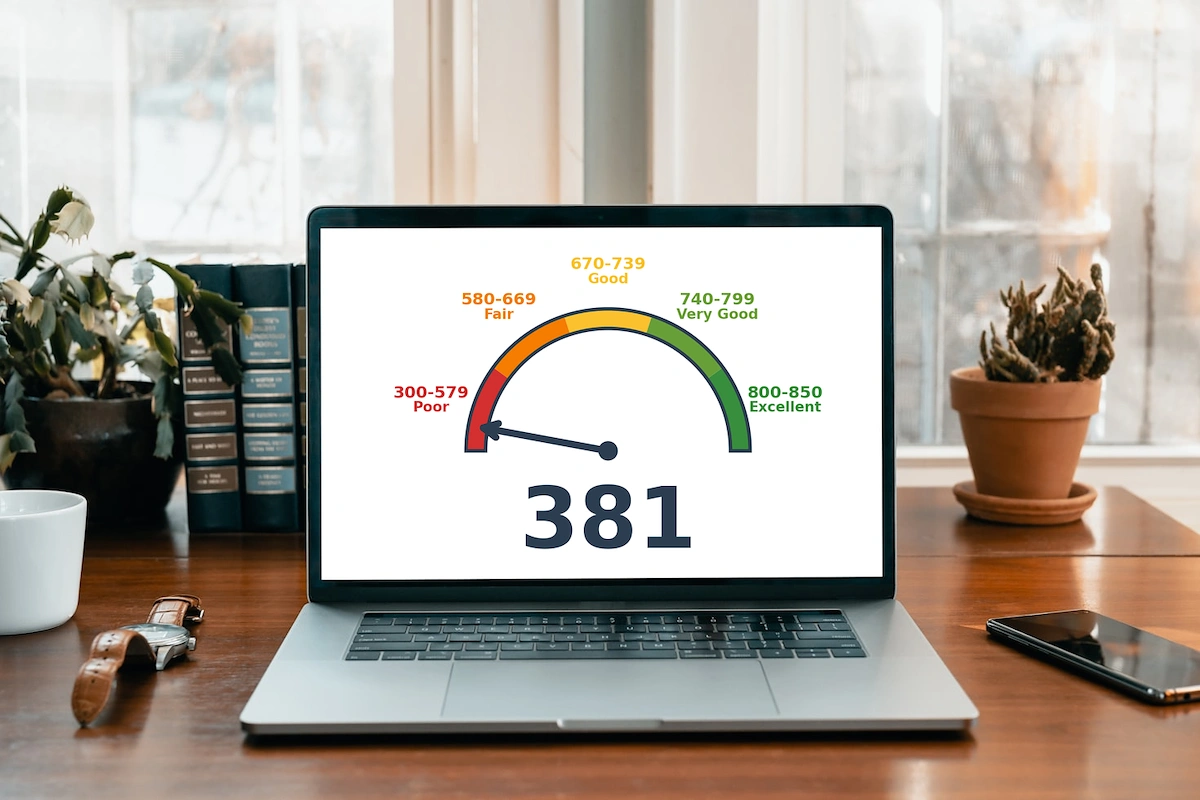
Kudos has partnered with CardRatings and Red Ventures for our coverage of credit card products. Kudos, CardRatings, and Red Ventures may receive a commission from card issuers. Kudos may receive commission from card issuers. Some of the card offers that appear on Kudos are from advertisers and may impact how and where card products appear on the site. Kudos tries to include as many card companies and offers as we are aware of, including offers from issuers that don't pay us, but we may not cover all card companies or all available card offers. You don't have to use our links, but we're grateful when you do!
381 Credit score: What You Need to Know in 2026
July 1, 2025


TL;DR
A 381 credit score presents an opportunity to build a stronger financial foundation, though it comes with some initial hurdles. This score falls into the 'Poor' FICO category, which simply means there's a clear path forward for significant improvement.
What Does a 381 Credit Score Mean?
A FICO score of 381 falls squarely into the "poor" credit range, which covers scores from 300 to 579. Lenders view a score this low as a sign of very high risk, suggesting a history of significant financial difficulties. To potential creditors, it signals a strong probability of future defaults or missed payments, making them extremely hesitant to extend any form of credit.
With a 381 credit score, the financial impact is immediate and significant. You will likely face outright rejections for most loans and credit cards, and even securing an apartment or a mobile phone plan can be challenging. If you are approved for credit, it will almost certainly be with very high interest rates and restrictive terms. While this presents a difficult financial reality, it's crucial to know that credit scores are not permanent and can evolve.
Who Has a 381 Credit Score?
While age isn't a direct factor in credit score calculations, there is a clear trend of scores increasing over time. According to 2023 Experian data, average credit scores vary significantly across different generations:
- Generation Z (ages 18-26): 680
- Millennials (ages 27-42): 690
- Generation X (ages 43-58): 709
- Baby Boomers (ages 59-77): 745
- Silent Generation (ages 78+): 760
Credit Cards With a 381 Credit Score
A credit score of 381 places you in the 'very poor' credit range, which will significantly hinder your ability to qualify for most credit cards. Lenders view such a low score as a strong indicator of high risk, making them hesitant to approve your application for traditional, unsecured cards. As a result, your choices will likely be limited to products like secured credit cards, which require a cash deposit, or certain unsecured cards designed for bad credit that often come with steep fees and high interest rates.
Kudos can help you find a card suited to your financial situation with its AI-powered tools that analyze your preferences for features like low interest rates or rewards. The platform provides personalized, unbiased recommendations and even offers credit score insights to help you make an informed choice.
Auto Loans and a 381 Credit Score
With a 381 credit score, you fall into the deep subprime bracket, making it challenging but not impossible to secure an auto loan. According to a 2025 analysis, lenders will likely offset their risk by charging you significantly higher interest rates than borrowers with better credit.
- Super-prime (781-850): 5.25% for new cars and 7.13% for used cars
- Prime (661-780): 6.87% for new cars and 9.36% for used cars
- Non-prime (601-660): 9.83% for new cars and 13.92% for used cars
- Subprime (501-600): 13.18% for new cars and 18.86% for used cars
- Deep subprime (300-500): 15.77% for new cars and 21.55% for used cars
Mortgages at a 381 Credit Score
With a 381 credit score, qualifying for a traditional mortgage is not feasible. Mainstream lenders have minimum score requirements that are significantly higher. For example, FHA loans require a score of at least 500 with a 10% down payment, while conventional loans typically need a 620. A score of 381 falls well below these thresholds, making standard mortgage products from most lenders essentially unavailable.
Even if you found a specialty or subprime lender willing to consider your application, a 381 credit score would result in extremely unfavorable terms. You would face very high interest rates, substantial fees, and a large down payment requirement. Lenders would also likely cap the loan amount, severely limiting your purchasing power and making any potential loan incredibly expensive.
What's in a Credit Score?
Figuring out what goes into your credit score can feel like trying to solve a complex puzzle, but it generally boils down to a handful of key elements. The most common factors include:
- Your payment history, which tracks whether you pay your bills on time, is the most significant factor.
- Credit utilization, or the amount of credit you're using compared to your total available credit, also plays a major role.
- The length of your credit history demonstrates your experience with managing credit over time.
- Having a healthy mix of different types of credit, such as credit cards and installment loans, can positively impact your score.
- Finally, recent credit inquiries, which occur when you apply for new credit, are also taken into account.
How to Improve Your 381 Credit Score
Your credit score plays a crucial role in your financial life, but a low score doesn't have to be permanent. With consistent effort and the right strategies, it is entirely possible to improve your creditworthiness and build a healthier financial profile.
- Establish Automatic Bill Payments: Your payment history is the most significant factor in your credit score. Setting up automatic payments is the first critical step to stop your score from falling and begin building a positive track record.
- Apply for a Secured Credit Card: With a 381 credit score, qualifying for traditional credit is challenging, but a secured card is designed for this exact situation. Making a small security deposit allows you to build a positive payment history and demonstrate responsible borrowing.
- Reduce Your Credit Utilization Ratio: This ratio compares your card balances to your credit limits, and lenders like to see it below 30%. Paying down existing balances is a key step that can provide a significant boost to a low score.
- Address Collection Accounts: Unpaid collections can severely damage your credit, so it's important to deal with them directly. You can often negotiate a settlement or a "pay-for-delete" agreement to remove this major negative mark from your report.
To help you manage your cards and track your progress, consider using the free tools and resources offered by Kudos.
Unlock your extra benefits when you become a Kudos member

Turn your online shopping into even more rewards

Join over 400,000 members simplifying their finances

Editorial Disclosure: Opinions expressed here are those of Kudos alone, not those of any bank, credit card issuer, hotel, airline, or other entity. This content has not been reviewed, approved or otherwise endorsed by any of the entities included within the post.



































.webp)







